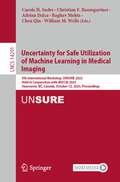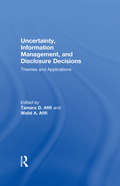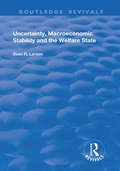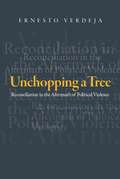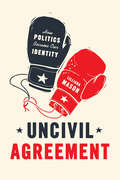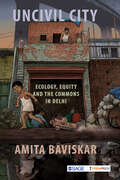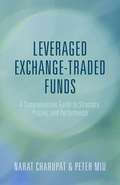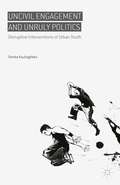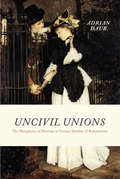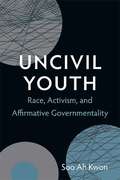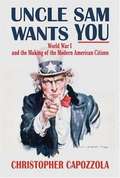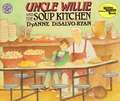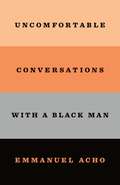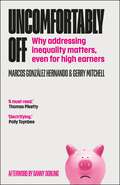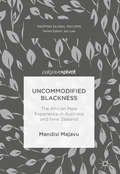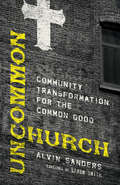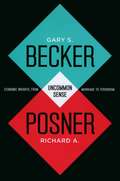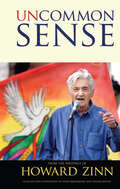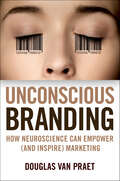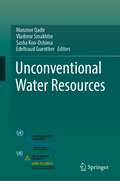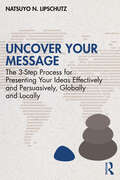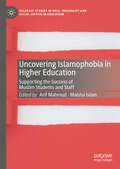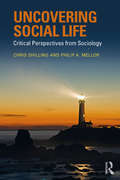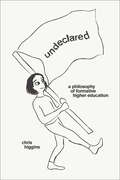- Table View
- List View
Uncertainty for Safe Utilization of Machine Learning in Medical Imaging: 5th International Workshop, UNSURE 2023, Held in Conjunction with MICCAI 2023, Vancouver, BC, Canada, October 12, 2023, Proceedings (Lecture Notes in Computer Science #14291)
by Adrian Dalca William M. Wells Carole H. Sudre Christian F. Baumgartner Chen Qin Raghav MehtaThis book constitutes the refereed proceedings of the 5th Workshop on Uncertainty for Safe Utilization of Machine Learning in Medical Imaging, UNSURE 2023, held in conjunction with MICCAI 2023 in Vancouver, Canada, in October 2023. For this workshop, 21 papers from 32 submissions were accepted for publication. The accepted papers cover the fields of uncertainty estimation and modeling, as well as out of distribution management, domain shift robustness, Bayesian deep learning and uncertainty calibration.
Uncertainty, Information Management, and Disclosure Decisions: Theories and Applications
by Walid Afifi Tamara AfifiThis volume integrates scholarly work on disclosure and uncertainty with the most up-to-date, cutting edge research, theories, and applications. Uncertainty is an ever-present part of human relationships, and the ways in which people reduce and/or manage uncertainty involves regulating their communication with others through revealing and concealing information. This collection is devoted to collating knowledge in these areas, advancing theory and presenting work that is socially meaningful. This work includes contributions from renowned scholars in interpersonal uncertainty and information regulation, focusing on processes that bridge boundaries within and across disciplines, while maintaining emphasis on interpersonal contexts. Disciplines represented here include interpersonal, family, and health communication, as well as relational and social psychology. Key features of the volume include: comprehensive coverage integrating the latest research on disclosure, information seeking, and uncertainty, a highly theoretical content, socially meaningful in nature (applied to real-world contexts), an interdisciplinary approach that crosses sub-fields within communication. This volume is a unique and timely resource for advanced study in interpersonal, health, or family communication. With its emphasis on theory, the book is an excellent resource for graduate courses addressing theory and/or theory construction, and it will also appeal to scholars interested in applied research.
Uncertainty, Macroeconomic Stability and the Welfare State (Routledge Revivals)
by Sven R LarsonThis title was first published in 2002: This monograph sets out to model a macroeconomy that is inherently unstable because of qualitative - or Keynesian - uncertainty. By modelling a macroeconomic theory, this approach to fixed or sticky prices also investigates the link between uncertainty, sticky prices, and macro-stability - by suggesting that such prices improve economic activity rather than impeding it.
Unchopping a Tree: Reconciliation in the Aftermath of Political Violence
by Ernesto VerdejaPolitical violence does not end with the last death. A common feature of mass murder has been the attempt at destroying any memory of victims, with the aim of eliminating them from history. Perpetrators seek not only to eliminate a perceived threat, but also to eradicate any possibility of alternate, competing social and national histories. In his timely and important book, Unchopping a Tree, Ernesto Verdeja develops a critical justification for why transitional justice works. He asks, “What is the balance between punishment and forgiveness? And, “What are the stakes in reconciling?” Employing a normative theory of reconciliation that differs from prevailing approaches, Verdeja outlines a concept that emphasizes the importance of shared notions of moral respect and tolerance among adversaries in transitional societies. Drawing heavily from cases such as reconciliation efforts in Latin America and Africa-and interviews with people involved in such efforts-Verdeja debates how best to envision reconciliation while remaining realistic about the very significant practical obstacles such efforts face Unchopping a Tree addresses the core concept of respect across four different social levels-political, institutional, civil society, and interpersonal-to explain the promise and challenges to securing reconciliation and broader social regeneration.
Uncivil Agreement: How Politics Became Our Identity
by Lilliana MasonPolitical polarization in America is at an all-time high, and the conflict has moved beyond disagreements about matters of policy. For the first time in more than twenty years, research has shown that members of both parties hold strongly unfavorable views of their opponents. This is polarization rooted in social identity, and it is growing. The campaign and election of Donald Trump laid bare this fact of the American electorate, its successful rhetoric of “us versus them” tapping into a powerful current of anger and resentment. With Uncivil Agreement, Lilliana Mason looks at the growing social gulf across racial, religious, and cultural lines, which have recently come to divide neatly between the two major political parties. She argues that group identifications have changed the way we think and feel about ourselves and our opponents. Even when Democrats and Republicans can agree on policy outcomes, they tend to view one other with distrust and to work for party victory over all else. Although the polarizing effects of social divisions have simplified our electoral choices and increased political engagement, they have not been a force that is, on balance, helpful for American democracy. Bringing together theory from political science and social psychology, Uncivil Agreement clearly describes this increasingly “social” type of polarization in American politics and will add much to our understanding of contemporary politics.
Uncivil City: Ecology, Equity and the Commons in Delhi
by Amita BaviskarAs cities become habitat for most of humanity, the question of their ecological capacity to sustain lives worth living becomes ever more critical. Yet, when we listen to debates about city planning and governance, and observe urban environmental campaigns on the ground, we notice that they have little to do with ecology or justice. To examine this contradiction, Uncivil City: Ecology, Equity and the Commons in Delhi looks at two decades of environmental politics in Delhi—across homes and workplaces, ordinary streets and extraordinary spectacles, and the river and the Ridge. It argues that the terms of the discourse—what is an environmental issue, who is authorised to speak, and which modes of action count as legitimate—are partial, particularistic and perverse. ‘Bourgeois environmentalists’, who claim to speak in the public interest, for nature and society, have made the city what it is: unfair and unliveable. Only citizenship and civility will save the commons—air, water, space and trees—upon which cities depend for survival.
Uncivil Engagement and Unruly Politics: Disruptive Interventions of Urban Youth
by Femke KaulingfreksThis book explores the significance of riots and public disturbances caused by marginalized youth with a migrant background in France and the Netherlands, and how their demands for recognition, justice and equal opportunities are voiced in uncivil, yet politically meaningful ways.
Uncivil Engagement and Unruly Politics: Disruptive Interventions of Urban Youth
by Femke KaulingfreksThis book explores the significance of riots and public disturbances caused by marginalized youth with a migrant background in France and the Netherlands, and how their demands for recognition, justice and equal opportunities are voiced in uncivil, yet politically meaningful ways.
Uncivil Unions: The Metaphysics of Marriage in German Idealism and Romanticism
by Adrian Daub“What a strange invention marriage is!” wrote Kierkegaard. “Is it the expression of that inexplicable erotic sentiment, that concordant elective affinity of souls, or is it a duty or a partnership . . . or is it a little of all that?” Like Kierkegaard a few decades later, many of Germany’s most influential thinkers at the turn of the eighteenth century wondered about the nature of marriage but rejected the easy answers provided by biology and theology. In Uncivil Unions, Adrian Daub presents a truly interdisciplinary look at the story of a generation of philosophers, poets, and intellectuals who turned away from theology, reason, common sense, and empirical observation to provide a purely metaphysical justification of marriage. Through close readings of philosophers like Fichte and Schlegel, and novelists like Sophie Mereau and Jean Paul, Daub charts the development of this new concept of marriage with an insightful blend of philosophy, cultural studies, and theory. The author delves deeply into the lives and work of the romantic and idealist poets and thinkers whose beliefs about marriage continue to shape ideas about gender, marriage, and sex to the present day.
Uncivil Youth: Race, Activism, and Affirmative Governmentality
by Kwon Soo AhIn Uncivil Youth, Soo Ah Kwon explores youth of color activism as linked to the making of democratic citizen-subjects. Focusing attention on the relations of power that inform the social and political practices of youth of color, Kwon examines how after-school and community-based programs are often mobilized to prevent potentially "at-risk" youth from turning to "juvenile delinquency" and crime. These sorts of strategic interventions seek to mold young people to become self-empowered and responsible citizens. Theorizing this mode of youth governance as "affirmative governmentality," Kwon investigates the political conditions that both enable youth of color to achieve meaningful change and limit their ability to do so given the entrenchment of nonprofits in the logic of a neoliberal state. She draws on several years of ethnographic research with an Oakland-based, panethnic youth organization that promotes grassroots activism among its second-generation Asian and Pacific Islander members (ages fourteen to eighteen). While analyzing the contradictions of the youth organizing movement, Kwon documents the genuine contributions to social change made by the young people with whom she worked in an era of increased youth criminalization and anti-immigrant legislation.
Uncle Sam Wants You: World War I and the Making of the Modern American Citizen
by Christopher CapozzolaUncle Sam Wants You tells the dramatic story of the mobilization of the American home front in World War I. In April 1917, the United States embarked on its first overseas war - with no history of conscription, an army smaller than Bulgaria's.
Uncle Willie and the Soup Kitchen
by DyAnne DiSalvo-RyanA gentle and age-appropiate introduction to two key issues of our time—hunger and homelessness—from a kid's point of view. This empathy-building book is good for sharing at home or in a classroom.
Uncomfortable Conversations With a Black Man
by Emmanuel AchoIn Uncomfortable Conversations With a Black Man, the author takes on all the questions, large and small, insensitive and taboo, many white Americans are afraid to ask―yet which all Americans need the answers to, now more than ever. With the same open-hearted generosity that has made his video series a phenomenon, the author explains the vital core of such fraught concepts as white privilege, cultural appropriation, and “reverse racism.” In his own words, he provides a space of compassion and understanding in a discussion that can lack both. He asks only for the reader’s curiosity―but along the way, he will galvanize all of us to join the antiracist fight.
Uncomfortably Off: Why Addressing Inequality Matters, Even for High Earners
by Marcos González Hernando Gerry MitchellIn highly unequal societies such as the UK, where the top 10% take a higher share of disposable income than in most other European countries, many feel resentment towards high earners. On paper, they are doing well, but inequality isn’t even working for them. Uncomfortably Off reveals that those generally considered to be the most affluent feel anxious about the future and struggle to keep up, or even to stay put. They are starting to doubt their common sense ideas about hard work and meritocracy as work pays less and less and life is becoming more uncomfortable. This book makes two crucial arguments. First, reducing income inequality will benefit everyone, even those quite near the top. Second, we need to understand the anxieties of high earners to understand their politics. As leading managers and professionals they have disproportionate influence on the institutions that rule over our public life. Their interests are ultimately not that dissimilar from those of the median earner: being able to afford a good quality of life in an ever more expensive and uncertain world. The hope of this book is to prompt high earners to question accepted truths and long-held beliefs that affect how they see themselves and judge others. In doing so, it seeks to help us all understand why dismissing the concerns of this group will not help in the fight to solve inequality.
Uncommodified Blackness
by Mandisi MajavuThis book is a study of the lived experience of African men in Australia and New Zealand. The author employs a relational account of racism which foregrounds how the colonial shaped the contemporary, with the settler states of contemporary Australia and New Zealand having been moulded by their colonial histories. Uncommodified Blackness examines the changing racial conditions in Australia and New Zealand, inspired by the view that as racial conditions change globally, prevailing racial modalities in these two countries must be reexamined and theory must be developed or revised as appropriate. Students and scholars across a range of social science disciplines will find this book of interest, particularly those with an interest in refugees, immigration, race and masculinity.
Uncommon Church: Community Transformation for the Common Good
by Alvin SandersHow can the people of God develop churches in ways that help and don't hurt poor neighborhoods? In urban ministry, Christians too often treat the poor as goodwill projects instead of people. Because of this mindset, many remain unchurched. Healthy, local, urban churches are needed because they combine personal empowerment and community transformation. Every poor neighborhood needs uncommon churches that will seek the common good of their communities. Alvin Sanders engages hard truths about these neighborhoods and provides a model for how to do ministry in difficult conditions. The local, urban church is the key to community transformation, as it plays three crucial roles of empowering, partnering, and reaching. Pastors and church planters interested in Christian community development will find here practical insights into the power of the local church, which is often underrated. Churches can serve their communities and improve the quality of life of every facet of the neighborhood.
Uncommon Sense: Economic Insights, from Marriage to Terrorism
by Richard A. Posner Gary S. BeckerA commentary on current events and economic issues, gathering the authors' most important and innovative entries.
Uncommon Sense: From the Writings of Howard Zinn (Series in Critical Narrative)
by Howard Zinn Dean Birkenkamp Wanda RhudyWhy Howard Zinn has become one of the most important and influential American historians is perhaps nowhere more evident than in this new book. Few social critics have been as inspiring as the ever-hopeful Zinn and, unlike many historians, Zinn turns historical details toward deeper observations on the universal truths and struggles of humankind. His remarkable wisdom and insight can be found in his earliest writings through his latest essays, speeches, and plays. Uncommon Sense brings together his most poignant and profound quotations from decades of writing and speaking. The book reveals the philosophical side of Howard Zinn and a consistency of vision over 50 years on topics ranging from government to race, history, law, civil disobedience, and activism. Offering quotations of universal and timeless quality, the book shows why history will regard this historian as a political and moral philosopher in the company of Paine, Jefferson, Frederick Douglass, and Martin Luther King Jr.
Unconditional Equality: Gandhi's Religion of Resistance (Cultural Critique Books)
by Ajay SkariaUnconditional Equality examines Mahatma Gandhi&’s critique of liberal ideas of freedom and equality and his own practice of a freedom and equality organized around religion. It reconceives satyagraha (passive resistance) as a politics that strives for the absolute equality of all beings. Liberal traditions usually affirm an abstract equality centered on some form of autonomy, the Kantian term for the everyday sovereignty that rational beings exercise by granting themselves universal law. But for Gandhi, such equality is an &“equality of sword&”—profoundly violent not only because it excludes those presumed to lack reason (such as animals or the colonized) but also because those included lose the power to love (which requires the surrender of autonomy or, more broadly, sovereignty).Gandhi professes instead a politics organized around dharma, or religion. For him, there can be &“no politics without religion.&” This religion involves self-surrender, a freely offered surrender of autonomy and everyday sovereignty. For Gandhi, the &“religion that stays in all religions&” is satyagraha—the agraha (insistence) on or of satya (being or truth).Ajay Skaria argues that, conceptually, satyagraha insists on equality without exception of all humans, animals, and things. This cannot be understood in terms of sovereignty: it must be an equality of the minor.
Unconscious Branding: How Neuroscience Can Empower (and Inspire) Marketing
by Douglas Van PraetFor too long marketers have been asking the wrong question. If consumers make decisions unconsciously, why do we persist in asking them directly through traditional marketing research why they do what they do? They simply can't tell us because they don't really know. Before marketers develop strategies, they need to recognize that consumers have strategies too . . .human strategies, not consumer strategies. We need to go beyond asking why, and begin to ask how,behavior change occurs. Here, author DouglasVan Praet takes the most brilliant and revolutionary concepts from cognitive science and applies them to how we market, advertise, and consume in the modern digital age. Van Praet simplifies the most complex object in the known universe - the human brain - into seven codified actionable steps to behavior change. These steps are illustrated using real world examples from advertising, marketing, media and business to consciously unravel what brilliant marketers and ad practitioners have long done intuitively, deconstructing the real story behind some of the greatest marketing and business successes in recent history, such as Nike's "Just Do It" campaign; "Got Milk?"; Wendy's "Where's the Beef?" ;and the infamous Volkswagen "Punch Buggy" launch as well as their beloved "The Force" (Mini Darth Vader) Super Bowl commercial.
Unconventional Water Resources
by Vladimir Smakhtin Manzoor Qadir Sasha Koo-Oshima Edeltraud GuentherThe world is faced with a growing number of complex and interconnected challenges. Water is among the top 5 global risks in terms of impacts, which would be far reaching beyond socio-economic challenges, impacting livelihoods and wellbeing of the people.As freshwater resources and population densities are unevenly distributed across the world, some regions and countries are already water scarce. Water scarcity is expected to intensify in regions like the Middle East and North Africa (MENA), which has 6% of the global population, but only 1% of the world’s freshwater resources. Climate change adds to this complexity as it is leading to rainfall uncertainty and extended droughts periods, mostly in arid areas.Increasing water scarcity is now recognized as a major cause of conflict, social unrest and migration and at the same time water is increasingly considered as an instrument for international cooperation to achieve sustainable development. Tapping and assessing sustainably every available option in water-scarce areas is needed as pressure continues to build on limited water resources.The stark fact is that conventional water provisioning approaches relying on snowfall, rainfall and river runoff are not enough to meet growing freshwater demand in water-scarce areas. Water-scarce countries need a radical re-think of water resource planning and management that includes the creative exploitation of a growing set of viable but unconventional water resources for food production, livelihoods, ecosystems, climate change adaption, and sustainable development. Unconventional water resources are generated as a by-product of specialized processes; need suitable pre-use treatment; require pertinent on-farm management when used for irrigation; or result from a special technology to collect/access water.
Uncover Your Message: The 3-Step Process for Presenting Your Ideas Effectively and Persuasively, Globally and Locally
by Natsuyo N. LipschutzWritten by a non-native English-speaking professional speaker with over 20 years of international consulting experience, this book lays out a step-by-step process to improve cross-cultural communication skills and achieve a strong global presence.Every year, organizations lose money, time, and people due to poor or inefficient cross-cultural communication – and this can be as easily between departments or individuals within an organization as across oceans. To tackle this widespread problem, Natsuyo N. Lipschutz developed the 3-step process she calls the “3As” (Acknowledge, Analyze, Adapt), using a unique multilayered approach: cross-culture × logical thinking × storytelling. Using the 3As process, readers will improve their awareness of cultural differences and learn analytical and logical thinking skills to zero in on their own unique message, tell persuasive stories, and ultimately get their messages not only clearly heard but acted upon in a culturally diverse global business environment.Filled with lessons and real-life stories from global companies and executives who benefited from Natsuyo’s guidance, this book will appeal to any business leader who needs to communicate with a diverse range of stakeholders, whether in a different country or a different team, to persuade and succeed.
Uncovering Islamophobia in Higher Education: Supporting the Success of Muslim Students and Staff (Palgrave Studies in Race, Inequality and Social Justice in Education)
by Arif Mahmud Maisha IslamThis edited collection documents the experiences of Muslim students and staff in UK higher education (HE), including their expertise and experiences in teaching, scholarship, policy and academic transitions as professionals, academics and students. At a time when UK HE at large is attempting to redress myriad racial and social injustices, this collection highlights how this meaningfully applies to Muslim students and staff who find themselves at the nexus of multiple, intersectional oppressions. The chapters presented, all written by Muslim authors, describe the inequalities faced by students and staff at all levels of their educational and professional journeys, exposing the fluid manifestations of Islamophobia within HE structures and institutions. Critically, the book advocates for hope by offering tools that universities and sector bodies can utilise to tackle challenging and nuanced cycles of inequity. This timely volume is essential reading for students, academics, professional service staff, and policymakers leading on diversity, equity and inclusion research, activity and interventions, or those within the sector who wish for it to become more equitable.
Uncovering Social Life: Critical Perspectives from Sociology
by Chris Shilling Philip A. MellorIn an era when rapid social change, the disappearance of traditional communities, the rise of political populism and the threat posed by radical religious movements makes it appear that ‘all that is solid melts into air’, the classical sociological problem of how peaceable societies can be created and maintained assumes renewed urgency. Uncovering Social Life: Critical Perspectives from Sociology explores how contemporary institutional changes erode existing social relationships and identities but also create space for opposition to, or creative adaptation of, these broader shifts. Exploring the threats and opportunities associated with the contemporary age, this book identifies how sociology helps us understand the problems associated with social order and change before focusing on the most important institutional transformations to have occurred in: bodies and health; sex, gender and sexuality; employment; finance; the Internet and new social media; technology and artificial intelligence; religion; governance and terrorism. After a critical introduction placing these issues in their historical and sociological context, theoretical chapters analysing how sociology views the individual/society relationship, and the volatile processes endemic to the modern era, provide an innovative and comprehensive context for these explorations. This book provides a clear and engaging account of social life. Covering a broad range of sociological topics, the diverse chapters are united in a concern with three major themes: the growing complexity of the current era, and the ‘doubled’ identities with which it is associated; the opportunities and constraints such developments pose to different groups; and the capacity of institutional changes to both erode existing social relationships, and create space for the emergence of new collective identities that oppose these structural shifts.
Undeclared: A Philosophy of Formative Higher Education
by Chris HigginsAn imaginative tour of the contemporary university as it could be: a place to discover self-knowledge, meaning, and purpose.What if college were not just a means of acquiring credentials, but a place to pursue our formation as whole persons striving to lead lives of meaning and purpose? In Undeclared, Chris Higgins confronts the contemporary university in a bid to reclaim a formative mission for higher education. In a series of searching essays and pointed interludes, Higgins challenges us to acknowledge how far our practices have drifted from our ideals, asking: What would it look like to build a college from the ground up to support self-discovery and personal integration? What does it mean to be a public university, and are there any left? How can the humanities help the job-ified university begin to take vocation seriously?Cutting through the underbrush of received ideas, Higgins follows the insight where it leads, clearing a path from the corporate multiversity to the renaissance in higher education that was Black Mountain College and back again. Along the way, we tour a campus bent on becoming a shopping mall, accompany John Dewey through a midlife crisis, and witness the first "happening.&” Through diverse and grounded philosophical engagements, Undeclared assembles the resources to expand the contemporary educational imagination.
